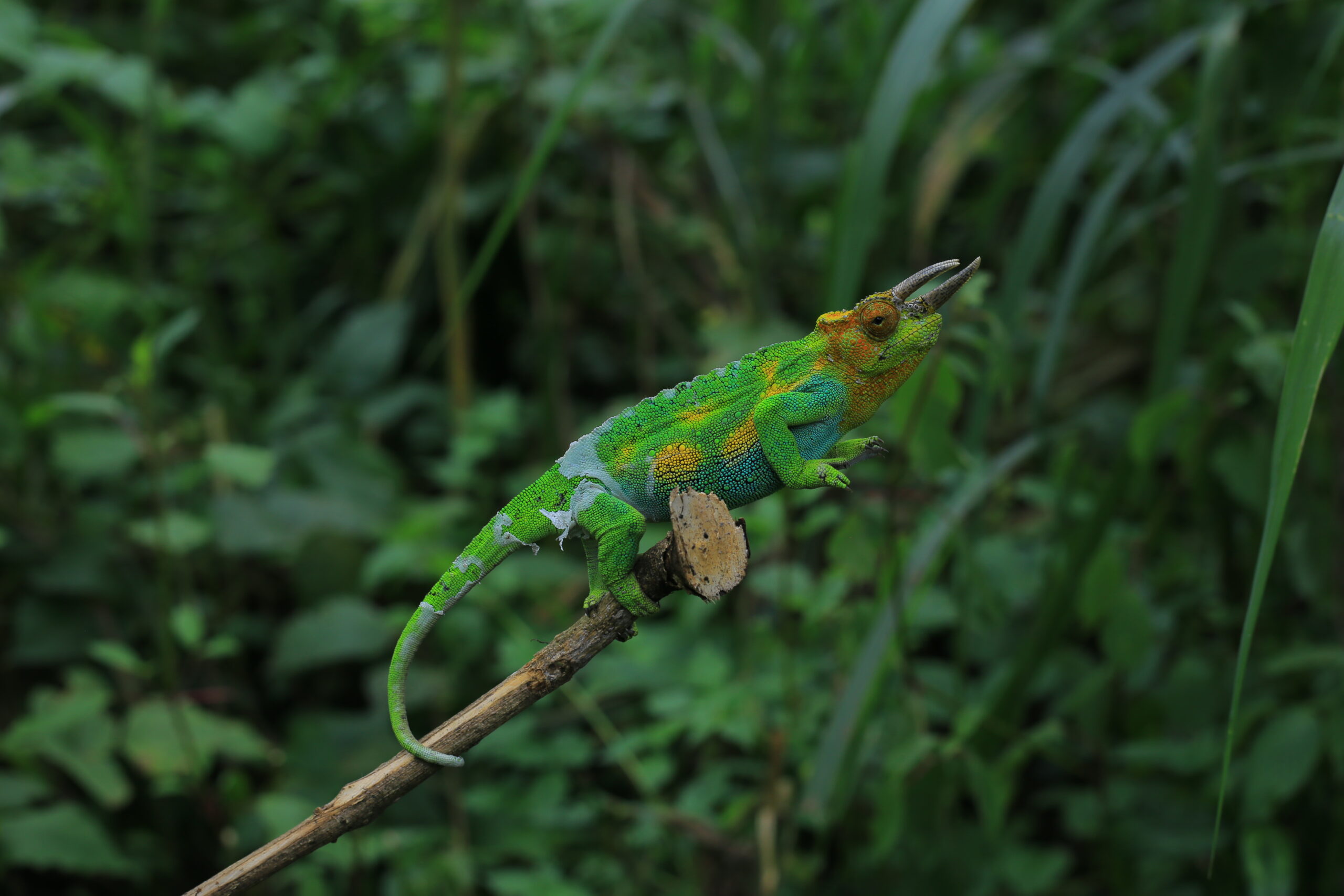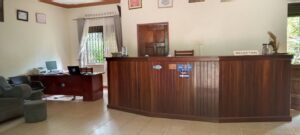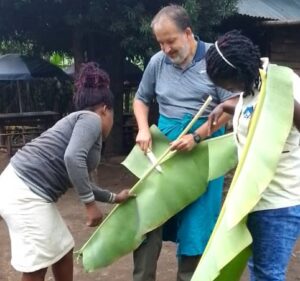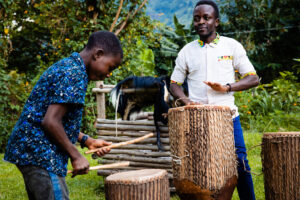Ruboni wins Best Tourism Villages international award
Many people and travelers are asking why Ruboni is 1 unique destination in Uganda, when they hear the recent recognition of Ruboni in Uganda, as a Best Tourism Village and an award winner By Best tourism Villages of the United Nations World Tourism Organization. Yes, the writer confirms that Ruboni village is a must visit on your trip to Uganda
Ruboni tourism village is a special destination that all travelers who love nature and culture must visit. While in Ruboni visitors learn the journey and effort the local community has taken to improve the status of the environment and economy both on community and household levels.
The uniqueness of Ruboni village
As Uganda is often referred to as the “Pearl of Africa,” Ruboni Village stands out as the true pearl of Uganda. This charming destination offers everything a traveler could wish for. In Ruboni, you can explore towering mountains, lush forests, and encounter primates in their natural habita. The village is located next to a National park, a UNESCO World Heritage site, and a Ramsar site, making it an ecological treasure.
Visitors can enjoy delicious local cuisine, unique crafts, and exhilarating safaris to Queen Elizabeth, the savanna landscapes bellow the Rwenzori Mountains.
Ruboni also boasts the rare experience of snow at the equator, and the Mubuku River, which contributes water to the Nile.
Additionally, Ruboni offers rich cultural experiences and unforgettable coffee adventures, making it an essential stop for any traveler in Uganda.
History of Ruboni Tourism Village
Ruboni village tourism activities started in 1998 as a result of the natural resource crisis that emerged after Rwenzori Mountains National Park had started in 1991. At this time, the village residents who were farming in the forest reserve before it was gazetted into a national park, didn’t have where to cultivate. This means, agriculture land, source if firewood, medicine, foods and other natural resources reduced.
As the pressure on the household land increased, the land output lowered, the tree cover reduced and the conflicts with the park increased since people kept trying to enter the park to get bush meat, wood products, medicines and gathering natural materials required for household use.
In 1998, the village members came together to form Ruboni Community Conservation and development Program (RCCDP). The mission of forming RCCDP was to encourage local community participation in environment conservation, with an aim of benefiting the entire community through sustainable development.
At that time (1998), Ruboni village was already seeing visitors, but was not receiving any. 100% of the visitors to Rwenzori were mountain trekkers. Guests used to pass through Ruboni village to and from the mountain trek, on the central circuit trail.
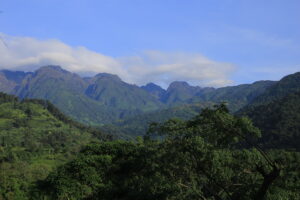
Solving an environmental and social crisis
The first action of RCCDP was to create community tourism products and activities. The aim was to create an alternative income generating activity to supplement agriculture.
To further address the issue of land degradation and famine, the community embarked on tree planting and soil and water conservation on household gardens within Ruboni village. This group of locals would mobilize the whole community to work on a particular member’s garden each day. The communal gardening work included digging contours, terraces, making compost manure, and water retainers.
Along with these tourism and conservation activities, Ruboni community would provide other training, Skilling and capacity building programs to create awareness and other alternative livelihoods. These interventions included adult literacy classes, hand crafts production, savings and credit schemes, animal revolving initiatives etc.
Community tourism was initiated in Ruboni village starting with a village walk, and putting up one safari tent (with two beds) on rented land within the community. At that time, there was no visitor wilting to or even knowing that there is a possibility of spending a night in Ruboni village. Meanwhile, the village walks were conducted in the household land and homes, in the hills, valleys and residential areas of the village.
RCCDP had signed a benefit sharing agreement with the forest owners. These few families would take 30% of the fees paid by the few tourists buying the village walk experience, and the community takes 80% to pay the guides, do marketing and management. As the small numbers of tourists kept staying and walking around the village, something worse happened. The need for natural resources and degradation increased on these forest pockets.
The bigger problem leading to a better solution
Soon the few forests in the valleys were wiped by the households for firewood, building materials, charcoal and other needs. The Community tourism idea seemed to hit a snag. Ruboni was forced to stop paying the forest owners since the forests had been cut or reduced. Then conflicts started to arise between the guides and landowners during the walks, as the land owners started asking for money everywhere the guests pass in the village, as the need for income increased in individual residents pockets.
As the situation got harder for Ruboni community tourism initiative, this was the time for a big solution that none of the community members imagined. The community used the little tourism savings (plus some donation from two friends) to buy an acre of land to build a community lodge closer to the park. It is on this land that Ruboni community camp is located. In the same year 2000, the community bought the first acre for the forest reserve, next to the park, north of River Mubuku in Buraru Village.
Through educating the guests and community about the crisis and needs of Ruboni community, RCCDP was able to get partners from among their community tourism visitors. These partners provided support to supplement the little tourism effort and the communal labor that was offered to help address the identified social and environmental problems. In a period of three years, Ruboni village had constructed a tourist lodge on a communal land and already accommodating guests. This lodge had two bedrooms, a restaurant, toilets and showers. They had also bought up to 20 acres of degraded forest next to the park. The restoration of the forest was being carried out while taking the guests for walks in this forest land.
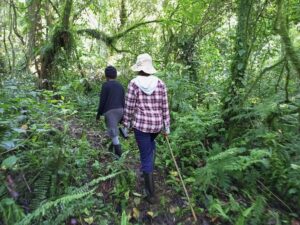
A community owned and run lodge with forest reserve achieved
At the time, in the year 2004 Ruboni was already accommodating guests in their own Community lodge and taking guests for a walk in their own community forest. The lodge and forest were a perfect sustainable solution to renting land for the campground with the one safari tent, and conflicting with the farmers when they claimed payments from visitors through the village. Along with the forest trail and accommodation, Ruboni established the village walk, traditional dance and a hill trek experience on the land that Uganda Community Tourism Association (UCOTA) had just bought for the community to restore natural forest on.
By the time, only 5% of the mountaineers were staying in the lodge and walking in the forest/ village before and after their trek to the Rwenzoris. This development stage was also the greatest learning and knowledge sharing stage for the members of Ruboni village, the tourists and other stakeholders
More achievements of Ruboni village in sustainability
Over the years, until the time of winning the best Tourism Villages award, Ruboni has employed all the innovative strategies to enhance sustainability in tourism of Ruboni village. To cut the long story short, to date Ruboni Village has achieved the following on this long sustainability journey;
- Acquired and created over 100 acres of indigenous forest at the park boundary
- A tourist lodge with eight bedrooms owned and run by the local community
- A tourist campground on the hill top offering outdoor camping experience
- Planting 50000 trees every year and creating conservation awareness
- Supporting community development projects in the different aspects
- Paying school fees for up to 50 children in school every year for over 10 years now
- Supporting women empowerment programs such as credits and saving schemes
- Developing a long list of community tourism products being sold and creating local employment
- Production, promotion and sale of handicrafts and associated experiences.
- Creating local and foreign partnerships in different aspects of community development including conservation, education, community and tourism development
Along the way, Ruboni is the only fully owned and run community tourism enterprise that invests all its profits into the community. The founders of this community tourism initiative have handed over the powers of ownership, management and benefits to the next generation of youth in the village. This has set a good example and best practice for a local rural community coming together to solve an environmental crisis with minimum intervention of government or external investment.
As a result, many other community tourism products and activities have sprouted in Ruboni village targeting the same market. By this time, the numbers of visitors coming to experience Ruboni village attractions and activities without entering the park have increased from 5% to 95% of the visitors coming to the area. This meaning, now the village received more visitors than those who are planning to go trekking in the Rwenzori Mountains National Park. Ruboni village has turned the challenge into a benefit.
The only 13 Best Tourism villages in Africa
No wonder Ruboni is the first and currently the only village that has received this sustainability award in Uganda, the third in East Africa after Rwanda and Kenya and the 13th in Africa, including;
- Abu Ghosoun, Egypt
- Gharb Suhayl, Egypt
- Dahshour, Egypt
- Siwa, Egypt
- Grand Baie, Mauritius
- Ruboni, Uganda
- Ksar Elkhorbat, Morocco
- Moulay Bouzerktoune, Morocco
- Sidi Kaouki, Morocco
- Wonchi, Ethiopia
- Bkassine, Lebanon
- Nkotsi Village, Rwanda
- Olergesailie, Kenya
To enhance collective sustainability in the whole village, Ruboni community has gone an extra mile in sustainability. We have further consolidated all tourism service providers in the village to develop promote and sell Ruboni as one product. This product is thus Ruboni Tourism Village. This is why, from 2020 and on we no longer talk about RCCDP or Ruboni Community Camp. We sing a new song of Ruboni Tourism Village. It is this collective village that received the Best Tourism Villages award from UN Tourism.
Ruboni Tourism village is a result of a 22 years journey of success after success. This is worth celebrating, and the best Tourism Villages award is worth for Ruboni community. Listening to the story anyone will be inspired during the visit and experience of Ruboni tourism activities.
This is why Ruboni is 1 unique destination in Uganda
Ruboni Tourism Village is a pool of unique tourism experiences showcasing the nature and cultural heritage of the Rwenzori Mountains of the Moon. It is collection of ten tourist accommodations including campsites, lodges, guesthouses and home stays. It is also a composition of over ten tourist activities that can be done by visitors coming to the village. These activities include;
- A forest walk with unique wildlife and small animals.
- A village walk showcasing the culture of Rwenzori that you wont find anywhere else in the world
- A hill climb trek with chances of viewing margarita peak
- A waterfalls challenge trek in the neighboring villages with over ten waterfalls
- Traditional dance experience of the Bakonzo people
- Cooking experience with a local mukonzo woman
- Evening cultural events showcasing the Bakonzo ways of life
- The organic gardening experience promoting eating health for the people and environment
- The coffee tours and experiences from farm to cup locally
- The traditional hunting tour as practiced by the Bakonzo gatherers decades in history
- The overnight hill trek, with outdoor wilderness camping experience on top of the village
- Rock climbing experience adventure and spot in the Rwenzori foothills.
Besides these activities in the village, outside the park, Ruboni village also sells three different tours inside Rwenzori Mountains National Park including a one-day nature walk, Mahoma trail and the central circuit trail to margarita and other peaks.
How to book Ruboni has also been improved greatly. It is possible to book all accommodation and activities by just one call. The introduction of a mobile application and credit card payment system has even made it easier for people planning to visit Ruboni. Everything about experiencing Ruboni is consolidated at the newly established Community visitors centre.
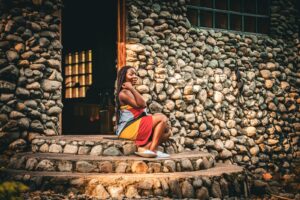
At the one-stop center you book all activities and accommodations
If you have reached in the area and arrive at the Ruboni tourism visitor’s center, you will be able to find all information. The map of the village with all attractions, a sales point for all activities and accommodation. We believe that soon or later, all travelers will be able to find this one point where accommodation and activity booking and information can be found at once. You can already try the link here to download the mobile application and access all activities and accommodation in Ruboni village.
Through the visitors center, those who will travel by public to Kasese town, can book their slot on the shared transport to the area. more information about this service can be read here
Local tourism sustainability guidelines
To further enhance sustainability, collective village tourism guidelines will be launched with support from the local government to ensure that all tourism service providers and visitors operate and or travel sustainably during their experience. This guideline will include a bunch of sustainability policies to give guidance to the stakeholders.
On the aspect of special inclusion and decent job creation, Ruboni village has initiated and supported women to equally participate in and benefit from tourism. Involvement of tourism in extensively conserving natural resources through tree planting, conservation awareness, alternative livelihoods and partnerships creation is another high score of Ruboni sustainability in tourism.
it is probably your time to come and experience Ruboni village. the journey starts with going to the village website

